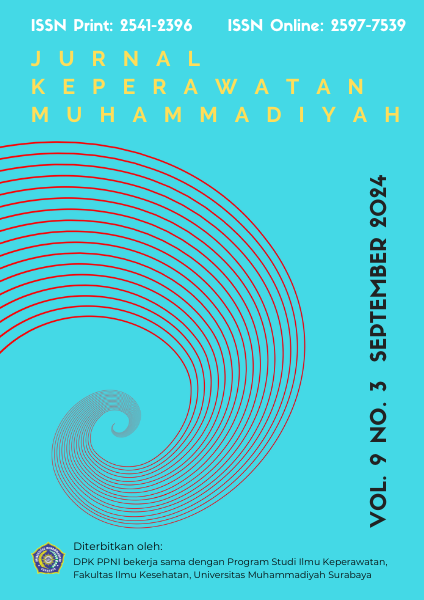Hubungan Frekuensi Baby Spa Dengan Pertumbuhan Fisik Bayi Usia 6-12 Bulan Di Klinik Salsabila Mom & Baby Spa Kota Tangerang Tahun 2023
DOI:
https://doi.org/10.30651/jkm.v9i3.21841Keywords:
Baby SPA, , physical growth, babies aged 6-12 monthsAbstract
Background: Baby's weight is an indicator in measuring baby's growth. One of the supporting factors that really determines physical growth is providing stimulation using Baby Solus Per Aqua (SPA) because it can increase the baby's appetite and thus influence the baby's physical growth. It is said to be routine if baby SPA is done twice a week.
Purpose of writing: To determine the relationship between the frequency of baby SPA and the physical growth of babies aged 6-12 months at the Salsabila Mom & Baby SPA Clinic, Tangerang City in 2023.
Research Method: This research is a quantitative analytical research with a case sectional design. The sample in this study was 60 respondents aged 6-12 months, divided into two, namely 30 respondents for the case group and 30 respondents for the control group using total sampling technique. The research instrument uses an observation sheet. The data is primary data analyzed using the square test.
Research Results: The results of the univariate analysis showed that 50.0% of babies aged 6-12 months routinely and non-routinely did baby SPA, most of the babies aged 6-12 months with physical growth increased by 61.7%. The results of the bivariate analysis showed a relationship between the frequency of baby SPA and the physical growth of babies aged 6-12 months with a p value of 0.008.
Conclusions and Suggestions: there is a relationship between the frequency of baby SPA and the physical growth of babies aged 6-12 months. Mothers of babies are expected to increase their knowledge about the benefits and how to do baby SPA so that mothers can do massage at home independently and do it regularly so that the baby's growth is optimal.
References
Chamida, A. (2019). Pentingnya Stimulasi Dini Bagi Tumbuh Kembang Otak Anak. Yogyakarta: Jurusan Pendidikan Luar Biasa UNY.
Dewi Q. (2020). Hubungan Frekuensi Baby SPA dengan perkembangan bayi pada usia 4-6 bulan di klinik Baby SPA Ananda Kecamatan Ambarawa Kabupaten Semarang. [Diakes 5 juli 2023]. Di dapat dari: Skripsi,http://www.pepusnwu.web.id/karyailmiah
Dinkes Prov Banten. (2022). Profil Kesehatan Provinsi Banten Tahun 2021.
Ekasari & Arum. (2019). Hubungan Frekuensi Kunjungan Baby SPA Dengan Kenaikan berat Badan Bayi Usia 2-3 bulan di klinik luqi medica. Journal for Quality in Women’s Health, 3 (1), 87–91.
Firmaningtyas. (2019). Pentingnya Baby SPA. Jakarta: TIM
Galenia. (2018). Home Baby SPA. Jakarta: Penebar Swadaya
Hidayat, AA. (2019). Pengantar Ilmu Keperawatan Anak untuk Pendidikan Kebidanan. Jakarta: Salemba Medika
Julianti. (2020). Rahasia Baby SPA. Jakarta: Penebar Swadaya.
Kaisa A. (2020). Hubungan SPA Bayi dengan Perubahan Berat Badan pada Bayi di Ummi Humairah Makassar. Skripsi Penelitian. Sekolah Tinggi Ilmu Kesehatan Panakkukang Makassar Program Studi S1 Keperawatan Makassar
Kementrian Kesehatan Republik Indonesia. (2022). Instrumen Stimulasi, Deteksi Dan Intervensi Dini Tumbuh Kembang Anak. Jakarta: Kemenkes RI.
Merineherta. (2019). Pengaruh Pijat Bayi Terhadap Peningkatan Berat Badan Bayi Usia 3-6 Bulan di Kelurahan Pasia Nan Tigo Kecamatan Koto Tangah Kota Padang. Naskah Publikasi. Padang: Universitas Andalas.
Prasetyono, D. S. (2019). Buku Pintar Pijat Bayi. Surabaya: Buku Biru.
Prastiani D, Setyaningrum I. (2019). Hubungan Frekuensi Baby SPA dengan Pertumbuhan Fisik Bayi Usia 6 - 12 Bulan. Jurnal Keperawatan ReSPAti Yogyakarta, 4 (1), 80-84
Roesli, U. (2018). Pedoman Pijat Bayi. Jogjakarta: Trubus Agriwidaya.
Soetjiningsih. (2021). Tumbuh Kembang Anak. Jakarta: EGC.
Udin. (2018). Pengertian Baby SPA. Jakarta: TIM
Downloads
Published
Issue
Section
License
Copyright (c) 2024 Iis Hanafiah , Lia Idealistiana

This work is licensed under a Creative Commons Attribution-ShareAlike 4.0 International License.
- Penulis tetap memegang hak atas karyanya dan memberikan hak publikasi pertama kepada jurnal ini yang secara simultan karya tersebut dilisensikan di bawah:Â Creative Commons Attribution-ShareAlike 4.0 International (CC BY-SA 4.0)













